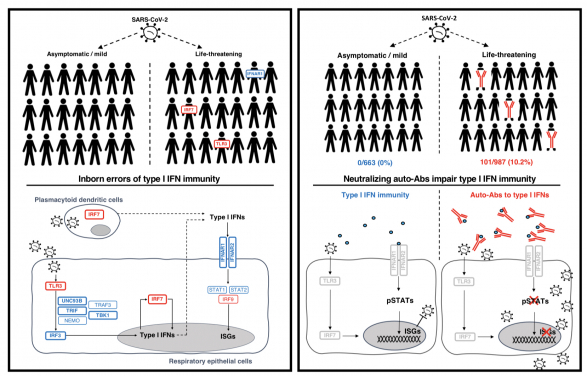
Researchers of the COVID Human Genetic Effort, including scientists from the Department of Paediatrics and Adolescent Medicine, HKUMed, have discovered inborn errors of immunity and auto-antibodies affecting type I interferon pathways in life-threatening COVID-19 patients of different ages. The findings help explain why some people develop a disease much more severe than others in their age group.
Researchers of the COVID Human Genetic Effort (COVID HGE), including scientists from the Department of Paediatrics and Adolescent Medicine, LKS Faculty of Medicine, The University of Hong Kong (HKUMed), discover that more than 10% of people who developed severe COVID-19, regardless of age and pre-existing medical conditions, had misguided auto-antibodies that attack the immune system itself, weakening the immune response. Another 3.5%, at least, had genetic diseases called inborn errors of immunity. The novel findings explain for the first time why some COVID-19 sufferers have a more severe disease than other patients their age, paving the way for invention of possible personalized treatment for these patients. The results also provide the first molecular answer why COVID-19 mortality is higher for men than women. The results have been published in two papers in Science, a pre-eminent science journal. [link to the publication: 1, 2]
The way SARS-CoV-2 affects people differently has been puzzling. The virus can cause a symptom-free infection and go away quietly, or it can kill in a few days. Research in the field has shown that unusual susceptibility to certain infectious diseases, such as lethal seasonal influenza or invasive pneumococcal disease, can be traced to single-gene mutations that affect an individual's immune response. Similarly, multisystem inflammatory syndrome in children (MIS-C) may also be due to single-gene errors.
Since February this year, investigators around the world in the COVID Human Genetic Effort have been enrolling thousands of COVID-19 patients to find out whether something in their genetic make-up drives the disparate clinical outcomes the disease produces. Researchers hypothesised that patients with life-threatening COVID-19 might, for different reasons, lack type I interferons (IFN-I), which are vital to the body's defence against viral infections.
In one study, the researchers genetically analysed blood samples from more than 650 patients with severe COVID-19. They may include the rare young patients which require intensive care, or older patients with good past health but life-threatening COVID-19. Genetic studies revealed that a significant number of people with severe disease carried rare variants in 13 genes related to IFN-I, and about 3.5% of them were in fact missing a functioning gene, meaning they had inborn errors of immunity. Examining 987 patients with life-threatening COVID-19 pneumonia, they found that more than 10% had auto-antibodies against IFN-I at the onset of their infection, impairing the IFN-I pathway and causing immunodeficiency. The majority of them, 95%, were men. Scientists may develop personalized treatment approaches for these two kinds of patients, for example, supplementation of IFN-I or plasmapheresis, for a higher chance of recovery.
About the research team
The findings are the first results being published by the COVID Human Genetic Effort (COVID HGE). Clinicians and researchers in inborn errors of immunity from more than 50 sequencing hubs, including the Department of Paediatrics and Adolescent Medicine, HKUMed, and hundreds of hospitals around the world are members of the COVID HGE, co-led by Dr Jean-Laurent Casanova at the Rockefeller University (NY, USA) and Institut Imagine (Paris, France), and Dr Helen Su at the National Institute of Allergy and Infectious Diseases (USA). The study participants included various nationalities from Asia, Europe, North and Latin America, and the Middle East.
In Hong Kong, sequencing hub leader Professor Lau Yu-lung , Doris Zimmern Professor in Community Child Health, Chair Professor of Paediatrics, Department of Paediatrics and Adolescent Medicine, HKUMed, and participating centre leader Dr Mike Kwan Yat-wah, Honorary Clinical Associate Professor, Department of Paediatrics and Adolescent Medicine, HKUMed and Consultant, Paediatric Infectious Diseases Unit, Princess Margaret Hospital are forming a network of physicians and paediatricians who are looking after COVID-19 patients for this purpose. Professor Lau, Dr Kwan and HKUMed MBBS/PhD candidate Mr Daniel Leung are co-authors listed under the COVID HGE consortium and COVID Clinicians consortium for the two Science papers.
The local arm of the study is funded by the Society for the Relief of Disabled Children.
About inborn errors of immunity care and research in Hong Kong
Inborn errors of immunity (IEI), also known as primary immunodeficiencies (PID), were previously thought as rare single-gene diseases affecting children only, but now understood to affect individuals of all ages. Patients could present with life-threatening infections, or immune dysregulation, such as hard-to-treat arthritis, atypical lupus or severe eczema.
The Department of Paediatrics and Adolescent Medicine, HKUMed is a tertiary referral centre for children with inborn errors of immunity in Hong Kong, led by Professor Lau Yu-lung and Dr Pamela Lee Pui-wah, Clinical Associate Professor at Department of Paediatrics and Adolescent Medicine and Assistant Dean (Clinical Curriculum). Since 2008, the Asian Primary Immunodeficiency Network (APID Network) established by Professor Lau and Dr Lee has provided free genetic tests to more than 2,500 IEI patients from more than 100 hospitals across Asia and Africa. Members include Professor Lau Yu-lung, Dr Pamela Lee Pui-wah, Dr Yang Wanling, Dr Cheong Kai-ning, Dr Jaime R. Duque, Dr Gilbert Chua T., Dr Yang Jing, Mr Chan Koon-wing, Mr Yang Xingtian, Mr Daniel Leung and Ms Ma Wen of the Department of Paediatrics and Adolescent Medicine, HKUMed.






